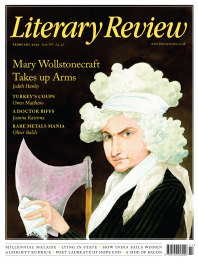Zareer Masani
Boiling with Raj
Time’s Monster: History, Conscience and Britain’s Empire
By Priya Satia
Allen Lane 363pp £25
It may seem surprising that Priya Satia, with a chair in history at Stanford University, should have chosen to write such an uncompromising polemic directed at her own profession. ‘Time’s monster’ for her is history as it is written by almost all historians, who not only record the past but also shape the future by providing policymakers with a lens through which to view the world, and then salve their consciences with pseudo-ethical justifications. Most of us might agree with her about some instances – she is rightly critical of the ‘great men’ approach to history and its role in brushing dubious episodes under the carpet. However, she takes virtually no prisoners in her sweeping condemnation of almost all Western historiography, from the age of Thucydides and Herodotus, through the Enlightenment and the Victorian era, down to our own postcolonial times. Only a small handful of fellow warriors, such as Shashi Tharoor, Priyamvada Gopal and Afua Hirsch, escape her censure.
A problem at the outset is a failure to define and differentiate history (what actually happened) from historiography (how historians have interpreted it) and historicism (how history has been hijacked to legitimise outcomes). Throughout this book, Satia uses these terms as though they are interchangeable.
Satia’s focus is the relationship between historians and the British Empire. Citing examples as diverse as Alan Bennett’s The History Boys and the writings of Winston Churchill, Satia asserts that ‘Historians were prominent among the architects of British power from the eighteenth century until very recently, as both policymakers and

Sign Up to our newsletter
Receive free articles, highlights from the archive, news, details of prizes, and much more.@Lit_Review
Follow Literary Review on Twitter
Twitter Feed
It wasn’t until 1825 that Pepys’s diary became available for the first time. How it was eventually decrypted and published is a story of subterfuge and duplicity.
Kate Loveman tells the tale.
Kate Loveman - Publishing Pepys
Kate Loveman: Publishing Pepys
literaryreview.co.uk
Arthur Christopher Benson was a pillar of the Edwardian establishment. He was supremely well connected. As his newly published diaries reveal, he was also riotously indiscreet.
Piers Brendon compares Benson’s journals to others from the 20th century.
Piers Brendon - Land of Dopes & Tories
Piers Brendon: Land of Dopes & Tories - The Benson Diaries: Selections from the Diary of Arthur Christopher Benson by Eamon Duffy & Ronald Hyam (edd)
literaryreview.co.uk
Of the siblings Gwen and Augustus John, it is Augustus who has commanded most attention from collectors and connoisseurs.
Was he really the finer artist, asks Tanya Harrod, or is it time Gwen emerged from her brother’s shadow?
Tanya Harrod - Cut from the Same Canvas
Tanya Harrod: Cut from the Same Canvas - Artists, Siblings, Visionaries: The Lives and Loves of Gwen and Augustus John by Judith Mackrell
literaryreview.co.uk